Key takeaways
- Cooking challenges enhance creativity and promote community among food enthusiasts.
- Mastering fundamental cooking techniques like searing and knife skills boosts confidence and improves dish quality.
- Alton Brown emphasizes understanding the science behind cooking, using the right tools, and organizing ingredients to enhance the culinary experience.
- Continuous improvement in cooking involves regular experimentation, seeking feedback, and maintaining patience throughout the learning process.

Cooking challenge recipes overview
Cooking challenge recipes are a fantastic way to push your culinary boundaries and refine your skills. I remember my first cooking challenge vividly; it felt exhilarating yet daunting. How often do we get the chance to step out of our comfort zone in the kitchen and truly test our creativity?
These recipes often involve specific themes or surprise ingredients, making each challenge unique and exciting. I find that they inspire not just innovation but also a sense of accomplishment. Have you ever felt that rush when you create something amazing from a seemingly random selection of ingredients? It’s an incredible feeling!
Participating in cooking challenges can also foster a sense of community. Sharing successes and even failures with fellow food enthusiasts enriches the experience and takes the pressure off perfection. Every attempt, whether stellar or not, contributes to your growth as a cook. It’s about enjoying the journey, isn’t it?
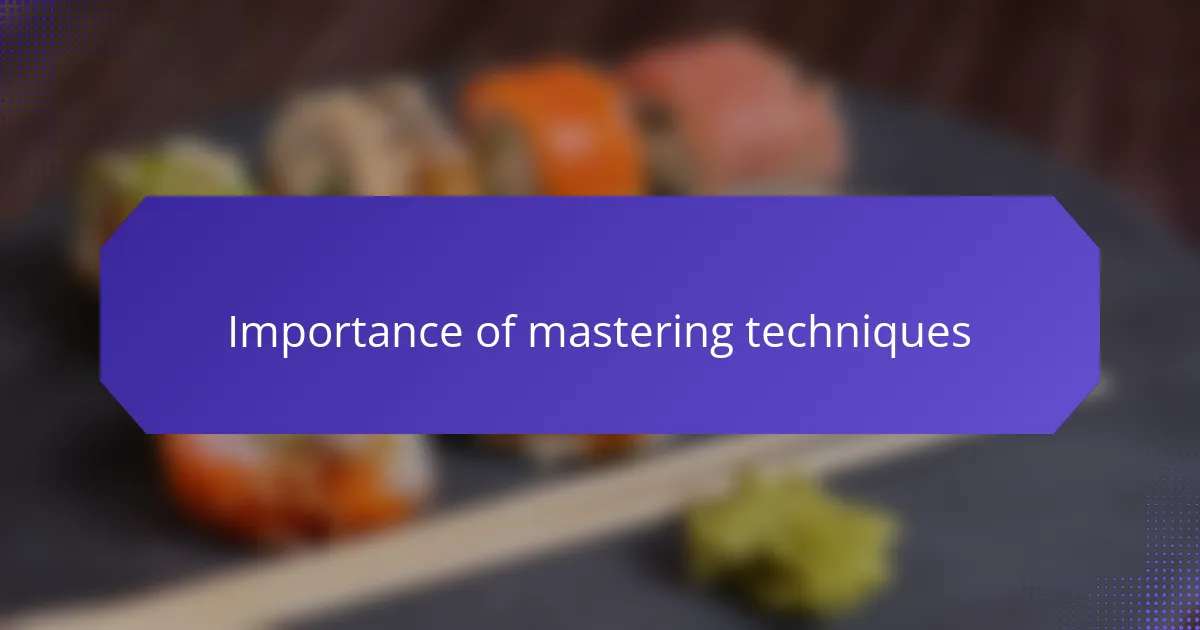
Importance of mastering techniques
Mastering cooking techniques is crucial for anyone who truly wants to elevate their culinary skills. From my experience, understanding the fundamentals allows you to manipulate flavors and textures with confidence. For instance, when I first learned how to properly sear meat, it transformed my dishes; that perfect caramelization brought out wonderful flavors I never knew existed.
In my cooking journey, I found that mastering these techniques reduces stress in the kitchen. Instead of second-guessing myself, I can focus on creativity and presentation. Knowing the science behind techniques not only enhances my cooking but deepens my appreciation for the craft itself.
Here’s a helpful comparison of fundamental techniques versus their effects in cooking:
| Technique | Impact on Cooking |
|---|---|
| Knife Skills | Ensures uniform cooking and enhances presentation. |
| Searing | Locks in juices and adds rich flavors through caramelization. |
| Emulsifying | Creates smooth and creamy sauces, elevating overall dish quality. |
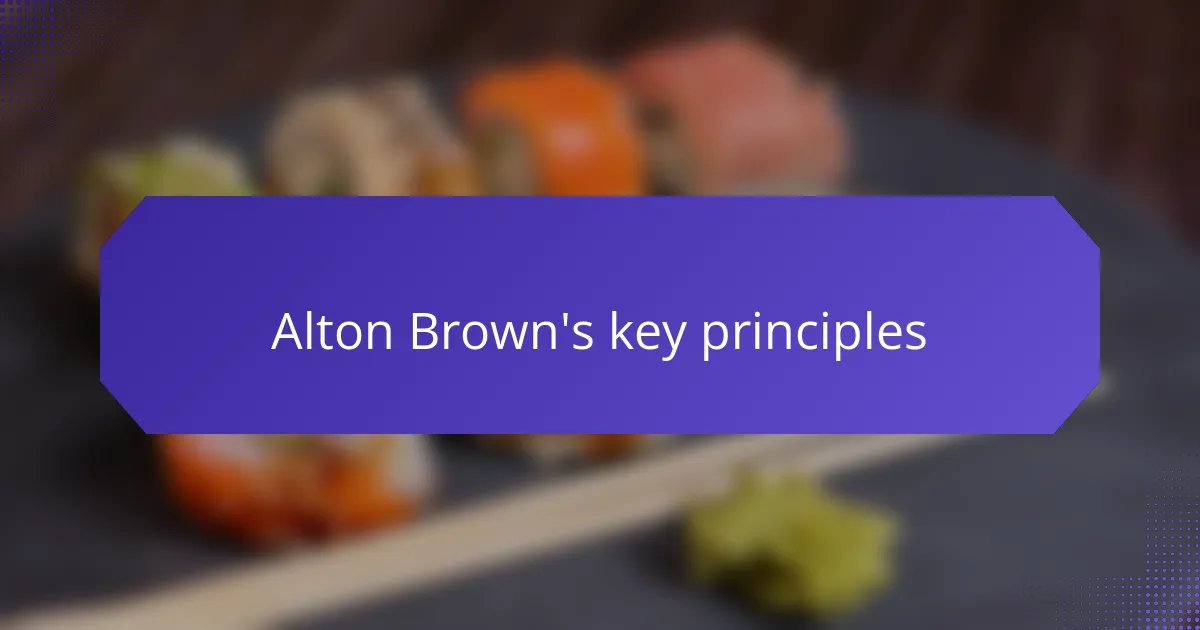
Alton Brown’s key principles
Alton Brown’s cooking principles resonate with me deeply, as they balance science and creativity in the kitchen. One key principle is to understand the “why” behind cooking techniques. For example, when I learned about the Maillard reaction—how proteins and sugars interact to create flavor—I started to appreciate not just the “how” of browning meat, but also the rich, complex flavors it brings to a dish.
Another fundamental is the importance of using the right tools. Early in my cooking journey, I often used whatever was at hand, but when I invested in a reliable instant-read thermometer, it transformed my cooking. Now, I feel more confident knowing that my meats are cooked to perfection, without any guesswork.
Alton also emphasizes the significance of mise en place, or having everything in its place before starting to cook. This practice has helped me streamline my process and reduce stress, allowing me to enjoy the cooking experience rather than feeling overwhelmed.
| Principle | Description |
|---|---|
| Understand the “Why” | Appreciate the science behind techniques to enhance flavors. |
| Use the Right Tools | Invest in quality tools, like thermometers, for better results. |
| Mise en Place | Organize ingredients and tools before cooking to reduce stress. |
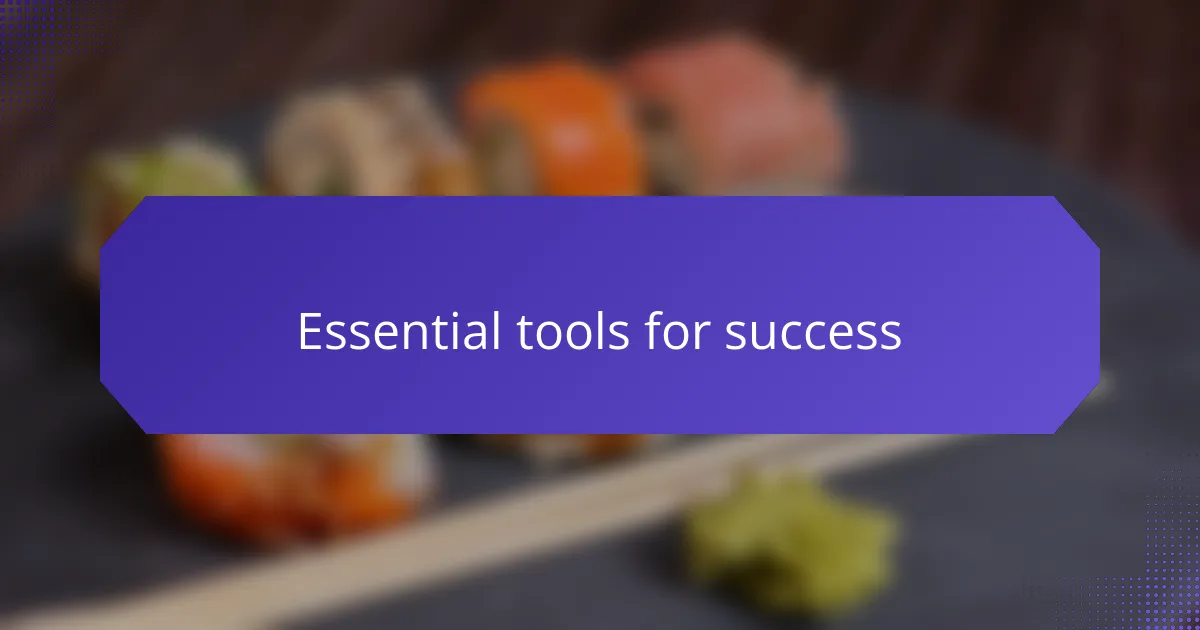
Essential tools for success
When it comes to mastering Alton Brown’s techniques, having the right tools can significantly elevate your cooking experience. I remember my first attempt at sous vide cooking; I was skeptical until I got a quality immersion circulator. That gadget not only simplified the process but also delivered perfectly cooked steaks every time, turning my kitchen into a restaurant-like haven.
Another essential tool I can’t live without is a good set of chef’s knives. I once thought any knife would do, but investing in a sharp, well-balanced chef’s knife changed everything. The ease of chopping and the precision it offers not only speed up my prep time but also make cooking feel more enjoyable. Have you experienced that satisfaction when slicing through ingredients with minimal effort? It’s a game changer!
Lastly, let’s not overlook the value of a sturdy cutting board. I’ve had my fair share of cheap ones, and the difference a solid, heavy-duty board makes is extraordinary. It provides stability and protects my countertops, allowing me to focus on what really matters: creating delicious meals. What about you? Have certain tools transformed your cooking experience?
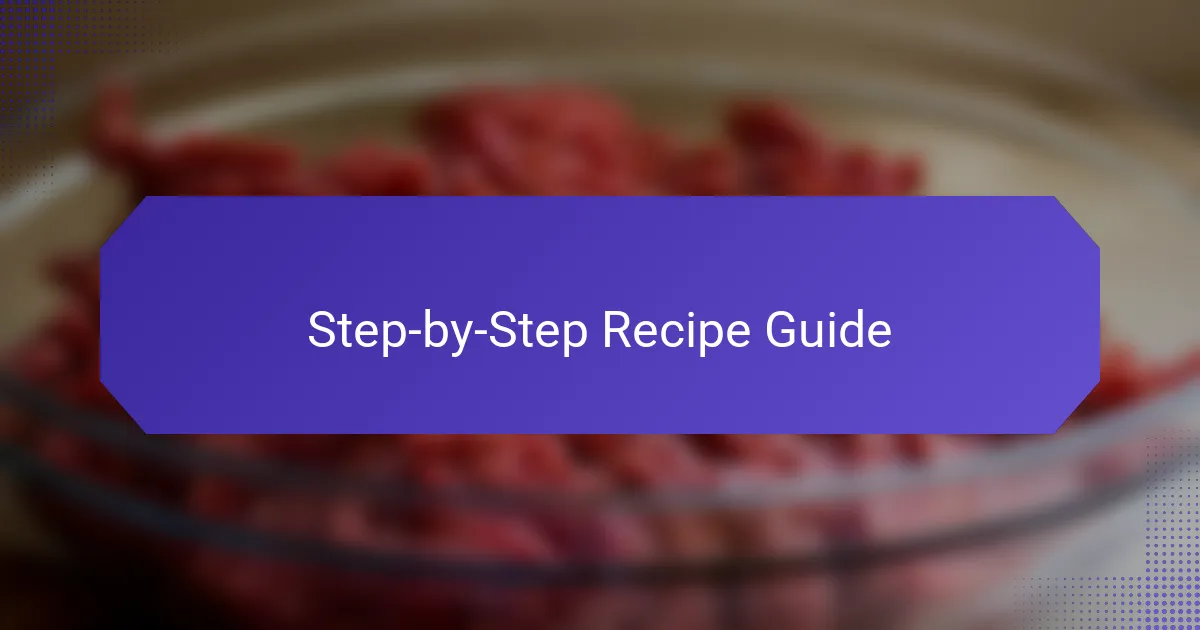
Step-by-step recipe guide
When I started diving into Alton Brown’s techniques, I was amazed at how his step-by-step approach made complex recipes feel manageable. For instance, breaking down a challenging dish into smaller, digestible parts not only boosts my confidence in the kitchen but also allows me to savor each step of the cooking process. I remember the first time I followed his miso-glazed cod recipe, taking the time to prepare the marinade separately—a detail I initially overlooked. That attention made all the difference.
There’s definitely a rhythm to following a well-structured recipe. Alton emphasizes the importance of precision and timing. Each step in his methods serves a purpose, whether it’s letting the ingredients rest or allowing flavors to meld together. These moments really enhance the final dish, and I’ve learned that patience and attention to detail are key to mastering his techniques.
Here’s a basic comparison of two types of cooking techniques: traditional vs. Alton Brown’s methods.
| Traditional Cooking Techniques | Alton Brown’s Techniques |
|---|---|
| Less focus on individual ingredient preparation | Emphasizes ingredient separation and preparation |
| Intuitive timing | Precise timing detailed in each step |
| Less scientific approach | Combines culinary art with scientific principles |
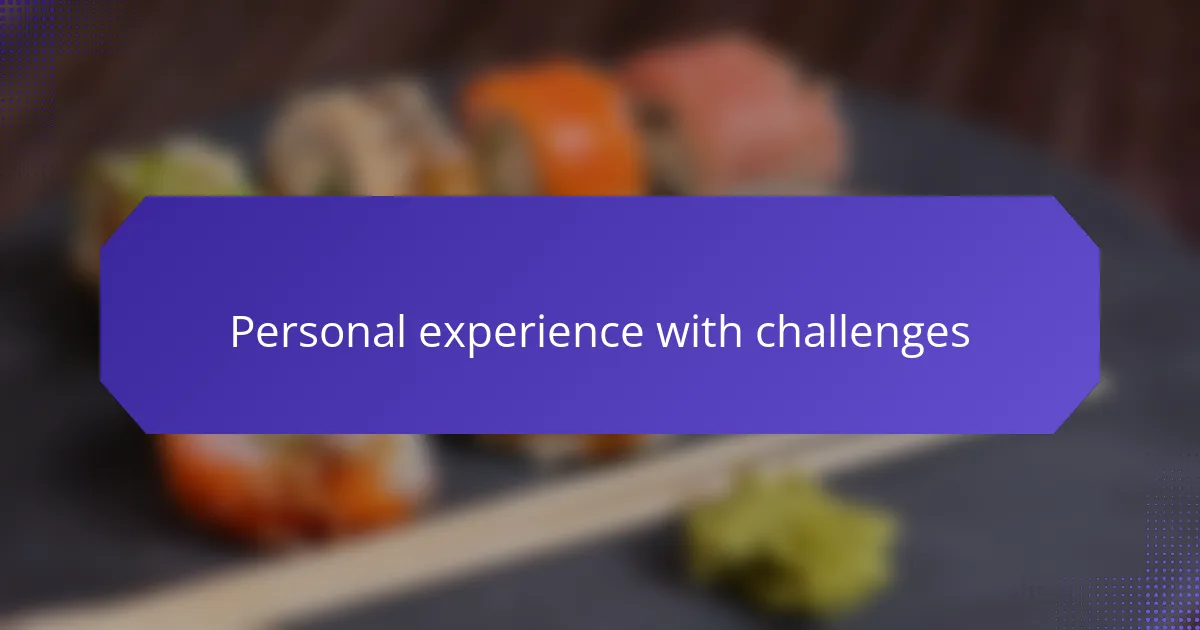
Personal experience with challenges
Embracing personal challenges in the kitchen has been a transformative experience for me. I vividly remember my first attempt at a cooking challenge that required using a mystery ingredient. Faced with a peculiar fruit I had never seen before, I felt a mix of panic and excitement. That moment forced me to think outside the box and craft a dish that not only surprised me but also delighted the taste buds of my family.
Over time, these challenges have become my favorite way to grow as a cook. Each hurdle, whether it’s mastering a new technique or improvising with unplanned ingredients, ignites my passion for cooking. I can’t help but ask myself, how often do we get the chance to learn something new while having fun?
I’ve learned to embrace failures as valuable stepping stones. Early on, I stumbled while trying to perfect a soufflé; it collapsed spectacularly, but that mishap taught me about timing and temperature. Isn’t it fascinating how each setback can lead to a breakthrough in understanding? That’s what keeps me coming back to face new challenges in the kitchen.
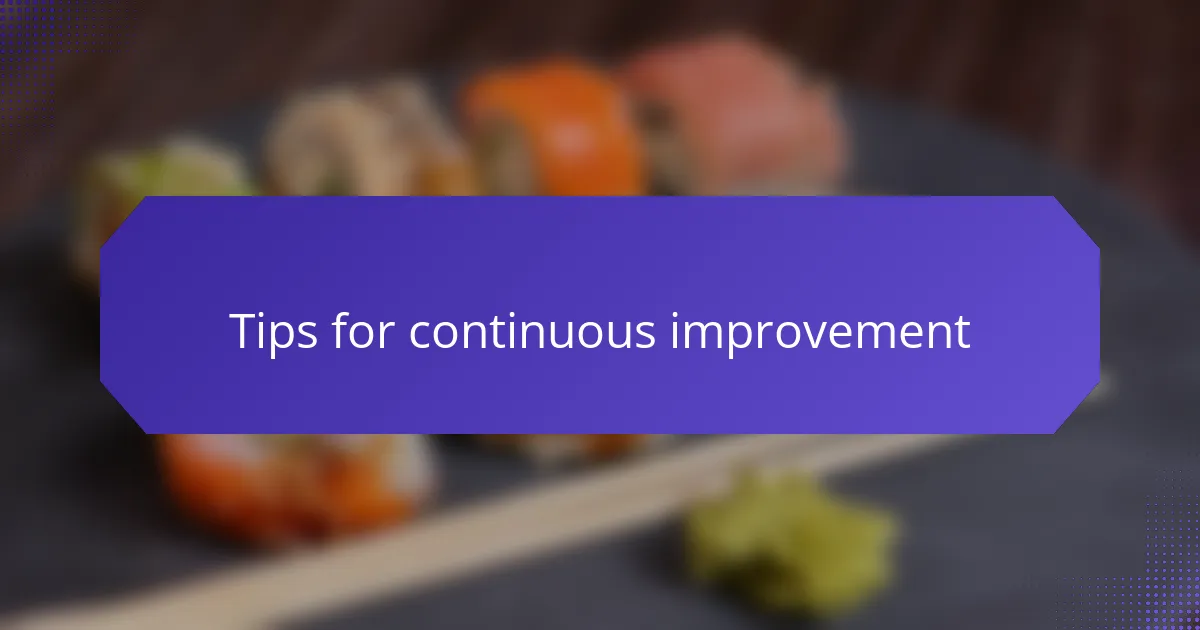
Tips for continuous improvement
Improvement in cooking isn’t just about trying out new recipes; it’s about continuously refining your skills. I remember when I first attempted Alton Brown’s technique for roasting vegetables. I followed his advice closely but realized I wasn’t getting the caramelization I wanted. After some trial and error, I learned that adjusting the temperature and timing made a significant difference in my results. The sense of accomplishment I felt when nailing it was incredible!
To keep evolving as a cook, I recommend the following tips:
- Experiment Regularly: Don’t shy away from pushing your culinary boundaries. Try refining classic recipes with personal twists.
- Take Notes: Document your successes and setbacks in a cooking journal. Reviewing them can provide valuable insights for future attempts.
- Seek Feedback: Share your dishes with family and friends. Their thoughts can help you see areas for improvement.
- Watch Cooking Shows: Study the techniques and tips presented by chefs you admire, as visual learning can enhance your skills.
- Practice Patience: Mastery comes with time. Allow yourself to learn from mistakes without frustration.


